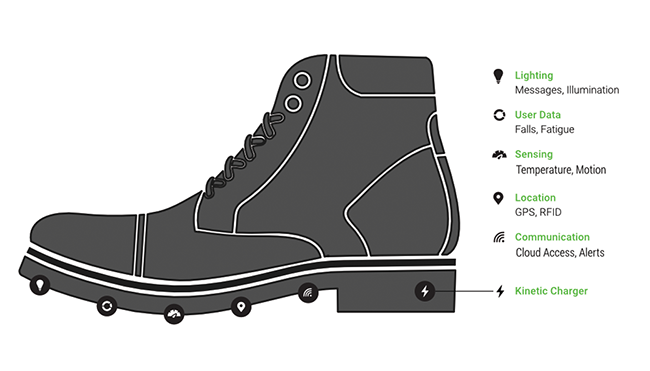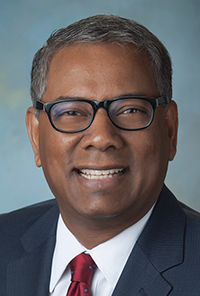SolePower unveils smart work boots for industry workers
Pittsburgh-based startup company SolePower has unveiled its most recent work boot prototype. The boots appear to be typical work boots until a user begins walking. Rectangular sections in the boots' heels illuminate bright orange—a visual indication the boots are charging.

SolePower smart work boots |
Inside the SolePower boots are a variety of sensors, including those for temperature detection, GPS, Wi-Fi, electronics and inertial measurement units, which track location and motion. Each sensor is powered by a kinetic charger that harnesses the energy produced by walking.
According to Cindy Kerr, SolePower's commercial director, SolePower created the first "self-charging, industrial wearable" to tackle ongoing safety issues in the industrial work space.
The work boot technology could help improve safety and efficiency in the building, construction, and oil and gas industries by enabling employers to monitor what workers are doing and where they are going.
Norwalk, Conn.-based safety and communications company Triax Technologies also is selling a smart wearable device: spot-r, which is about the size of a pack of chewing gum and fastens to a belt. A small sensor inside the device tracks a worker's movement and indicates when slips and falls occur. Workers also can press a button to point out safety concerns, such as a hazardous spot in the field.
Although the smart devices may provide potential safety benefits, their tracking ability is controversial. Potential privacy infringement has consumers and workers pushing back against wearable safety products with sensors.
After finding it was nearly impossible to persuade workers to wear devices with GPS tracking, Triax Technologies began developing a closed, secure network set up on-site to address privacy concerns.
"You can think of it like the Wi-Fi at your house," says Chad Hollingsworth, co-founder and president of Triax Technologies. "When you come home, your phone automatically connects. The workers' sensors they wear on their belts automatically connect to the network and then check them out."
According to research from the McKinsey Global Institute, construction is one of the least digitized sectors in the world, so there is a sizeable market available for wearable safety devices to capture. In its 2017 report, the McKinsey Global Institute estimated the world will need to spend $57 trillion on infrastructure by 2030 to keep up with global GDP growth. In the construction sector, even a fraction of a percentage change in productivity could result in substantial savings.
According to Kerr, it can be challenging for employers to track workflow on job sites. As a result, job-site inefficiencies can go unnoticed.
"We need to know who is on the site and where they are at any given time," she adds. "You can't actually improve efficiency if you don't measure."
Hollingsworth agrees using a clipboard to manually track workers' job-site movements is ineffective.
"Most of these job sites can't tell you how many workers they have or where they are," he says.
According to the Bureau of Labor Statistics' 2015 National Census of Fatal Occupational Injuries report, fatal injuries in construction increased 2 percent in 2015 to 924 cases—the highest level since 2008. Despite privacy concerns, the need to help ensure workers' safety may help spur the adoption of wearable smart safety products on job sites.
SolePower's business model currently consists of an initial fee for the work boots comparable to the price of a regular pair of high-quality work boots, Kerr explains. A monthly subscription charge also is assessed for data services through an online dashboard. If employers are willing to provide wearable smart safety products to their employees, the products may offer a monetary advantage to construction workers who currently pay for their own gear.
Ultimately, the success of wearable smart safety products likely will depend on convincing employees the new gear is worth it, Hollingsworth says.
"You have to show workers that first and foremost, this is a safety device," he concludes.
International Accreditation Service announces new president

Nathan |
The International Code Council (ICC) and the International Accreditation Service Inc. (IAS) board have announced Raj Nathan, IAS senior vice president, was selected as the new president of IAS. Nathan will assume the role in March 2018 following the retirement of C.P. "Chuck" Ramani, who is retiring after a 44-year career in global conformity assessment and construction code enforcement.
IAS is a nonprofit, scientific and educational subsidiary of ICC that accredits calibration and testing laboratories, inspection service providers, building/code enforcement agencies, fabricators, metal builders' and assemblers' inspection programs, management system certification bodies, product certification agencies, personnel certification bodies, and related conformity assessment organizations.
Nathan has served at IAS since 2002 and has more than 30 years' experience in business development, operations, accreditation and conformity assessment. During his tenure at IAS, Nathan spearheaded a major restructuring of the organization's operations to better serve clients' needs, led a multiphased software development effort to automate internal processes, directed an enhanced digital marketing strategy and spearheaded IAS' global business services. He holds a master's degree in industrial engineering and management systems from the University of Nebraska, Lincoln, and a bachelor's degree in electronics and electrical engineering from Osmania University, Hyderabad, India.
"On behalf of the IAS board, I'm excited to welcome Raj as the new IAS president," says James G. Toscas, chairman of IAS' board of directors. "Raj has been a dedicated member of the IAS team and an important factor in the remarkable growth of the organization for many years, and we all look forward to working with him closely during this transition and beyond."
"Raj's appointment as president is the culmination of many years of hard work and commitment to IAS," says ICC CEO Dominic Sims. "Under his vision and leadership, we're sure to see a continued focus on quality services, customer satisfaction and global growth."



